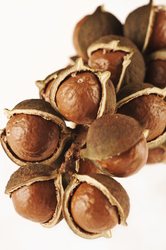Originally published by Rachel Berman on 6/12/2013
 Move over omega 3’s, omega 7’s are now in the fatty acid research spotlight. While you’re probably well aware of how omega 3’s from fatty fish, nuts and seeds can do your body good, I’m betting you know less to nothing about omega 7’s. Let me break it down for you.
Move over omega 3’s, omega 7’s are now in the fatty acid research spotlight. While you’re probably well aware of how omega 3’s from fatty fish, nuts and seeds can do your body good, I’m betting you know less to nothing about omega 7’s. Let me break it down for you.
Omega 7’s are monounsaturated fatty acids. That means, the carbon thread is not completely tied to (or saturated with) hydrogen. There’s one (mono) unsaturated carbon and the double bond between carbons occurs at the 7th carbon molecule, hence the name. Omega-3s comes at the 3rd molecule (surprise!).
Omega 7’s are non essential, meaning our body can make them. However they’re also found in foods like cold-water fish, macademia nuts, and a fruit called sea buckthorn berries. Conversely, omega 3’s are essential, meaning our body cannot produce them and it’s necessary we get ’em from food.
The omega 7 which has been researched lately for it’s health benefits is known as palmitoleic acid. Although commonly found in foods together, don’t confuse this with palmitic acid. The latter is found in palm oil, some dairy and meats, and has been shown to be pro-inflammatory, associated with increasing your risk for heart disease and diabetes. On the other hand palmitoleic acid seems to do the exact opposite and reduce inflammation (on a more science-y level, lower C-reactive protein levels).
So if they aren’t essential and often found alongside something which may not be desirable, why should you care?
Research shows, mostly in animals to date, that when subjects are given a purified form of the palmitoleic acid, they experience reduced cholesterol, triglycerides and even body weight. Researchers speculate this has to do with improved insulin response resulting in better blood glucose control which can lower risk of developing diabetes and obesity too.
I’m not telling you to go out and eat a boatload of macademia nuts. Although research shows that foods like macademia nuts can help your cholesterol levels too even with the palmitic acid present. However, what is intriguing is that omega 7 supplements are made from the leftovers from omega 3 extraction from fish. And in light of recent research showing that omega 3 supplements are not as good as fish for heart disease prevention, maybe omega 7 is the key to why that is.
Click here for original article.
** SIDE NOTE ** Let’s not forget that sea buckthorn is THE MOST POTENT source of omega 7 fatty acids. Much more so than Macadamia nuts.

